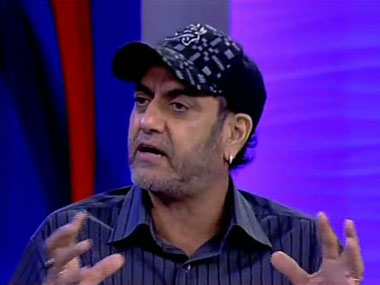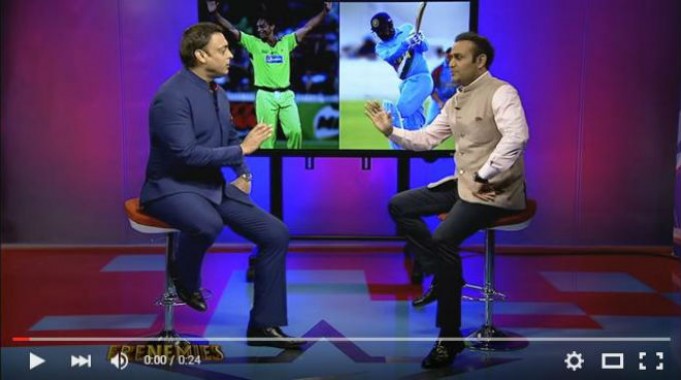Cricket on TV: Egos, axes, and biases
(left) Shoaib Akhtar and (right) Virendra Shewag on the sets of Frenemies on Star Sports
With the Champions Trophy earlier and now the T20 World Cup being held in India for the first time, cricket is attracting more viewers than ever before, forcing the constantly expanding network of TV channels to find some known faces of Indian cricket to work as commentators.
But has the selection of experts or commentators always been in the interests of the game? Or is the money that comes with the job bringing in some cricketers who should in fact be kept away from the commentary box for their biases or dubious past?
The Nawab of Najafgarh, Virendra Sehwag, raised this question when he said that Pakistan’s Shoaib Akhtar had no love for India and was only praising India so that he could get a contract as a commentator here. He added that a lot of Pakistani ex-cricketers were coming to India for jobs (and we know the names).
It is difficult to disagree with Sehwag’s opinion but it is also time to look into our own backyard. Are we doing justice to the game and to audiences by having ‘experts’ who have either played very few games or have expressed strong resentment at their ouster, sitting in the exalted company of Sunil Gavaskar, Ravi Shastri, Kapil Dev, Anil Kumble, V.V.S Laxman and Sourav Ganguly?
Some of these players had match-fixing allegations levelled against them and had to leave their careers in disgrace. Others threatened to divulge secrets because they were angry at being dropped from their highly paid jobs.
TV channels are obviously free to choose their commentators but there are times when the comments of these less than honourable men are deliberately aimed at creating a rift in the dressing room, particularly when the chips are down, which is suicidal for a cricket-loving nation.
Look at the loaded comments of Maninder Singh, a former national left-arm spinner. In 2014 when the Indian team was going through a bad patch, he said about R. Ashwin, the opening bowler of the team in most matches today,” Someone has got to tell him that you were picked for the Indian side because you showed that intent that you wanted to get wickets in the IPL, in 20-overs games…Then you come into a Test match and after the Australia series [last year], I read somewhere, he said 'my role was to restrict'. Now who has given him that idea? It's the captain.”

Maninder Singh
Fortunately Ashwin and Indian cricket team captain M.S. Dhoni know each other too well to let this create a rift. In fact, Dhoni has been blamed for being too partial to Ashwin and Suresh Raina, both of whom were part of the erstwhile Chennai Super Kings team which Dhoni captained. Today, Ashwin is the topmost wicket taker in the country under the leadership of the same captain whom Maninder Singh accused of giving the wrong advice.
And who is Maninder Singh anyway? He got his break at the young age of 17 and was considered a protégé of Bishan Singh Bedi. He had a glorious career spanning 35 tests and 59 ODIs. But once his time was up, he was dropped. He tried to make a comeback in the 1990s but instead fell on bad days, being arrested for carrying cocaine. Falling on bad times is no crime and can happen to all of us but his frustration and harshness in front of the mike are displeasing.
Another prominent face on TV - though not always speaking about cricket - is Vinod Kambli. A contemporary of Sachin Tendulkar, Kambli set records that surpassed those of Tendulkar: two double centuries and three consecutive centuries in three innings but what about after that?
After contesting elections in Maharashtra unsuccessfully, he has been more active in films and on reality shows than at cricketing events. He made a spectacle of himself by speaking out against Tendulkar on a reality show for not helping him out. Then he did the unspeakable when he made allegations of match fixing against the Indian team when it lost to Sri Lanka in the 1996 World Cup.
Kambli claims that he was victimised after the match because he had spoken out about at what happened behind the scene but this is inaccurate because his last ODI was played in 2000, long after the quarter-final of the World Cup.
How can the nation take seriously the comments of a man who does not take himself seriously?
And who does Manoj Prabhakar remind you of? Prabhakar was an all-rounder who made an impressive debut in 1984 and played till 1995. But he was dropped from the team after match fixing allegations in 1995/96. In 2001 he was selected as a bowling coach for Delhi but was dropped after he criticised the selectors in the Delhi & District Cricket Association (DDCA). He too tried his hand at politics but failed. The last anyone heard of him, he had been selected as the bowling coach for Afghanistan.
But his grudge against DDCA and the Board of Control for Cricket in India (BCCI) continues. "Let's not talk about DDCA. The less said the better it is. We all know and can see what exactly is happening. But I also felt that BCCI never thought of using my knowledge on swing bowling at any level,’ he said on one occasion.
To invite such a biased person to comment on a cricket match is not a good idea as he will never be able to do justice to the task.
Another player whose career crashed owing to match fixing allegations is Ajay Jadeja who played 15 tests and 196 ODIs but was dropped for five years on match fixing charges in 2000. The order was quashed by the Delhi High Court in three years but Jadeja failed to make a comeback. However, he makes a good impression as a commentator because he comes across as polished as, say, Sourav Ganguly or Harsha Bhogle, and has a certain charm. Yet the black spot against his name does not make him an obvious choice.
Another commentator one wonders about is Sanjay Manjrekar who was regarded as the next Gavaskar technically, but in his 37 tests and 79 ODIs he could barely manage four and one century respectively. He tried to reinvent himself later but did not last. His performance as a commentator is good but he hardly qualifies as a veteran player of distinction.
By far the biggest upstart among the current lot of cricketer-commentators appears to be Atul Wasson who played barely four tests - all abroad - and whose career ended when he was 22. He had an impressive record as a medium pacer and a long haul in his Ranji career, getting 213 wickets and a century but when he comes on TV to give his comments, viewers have to Google him to find out his background.
Other odd choices as commentators are Chetan Sharma whose Test career lasted barely five years and former wicket-keeper and Chief Selector Syed Kirmani who comes across on TV as too harsh and judgmental.
Former players who have bruised egos, resentments, an axe to grind or obvious biases cannot be expected to deliver a fair and impartial commentary in international matches. They should be avoided.
Amitabh Srivastava has worked with the Hindustan Times group for 27 years, and with the Sahara Times. He is now a freelance journalist.
